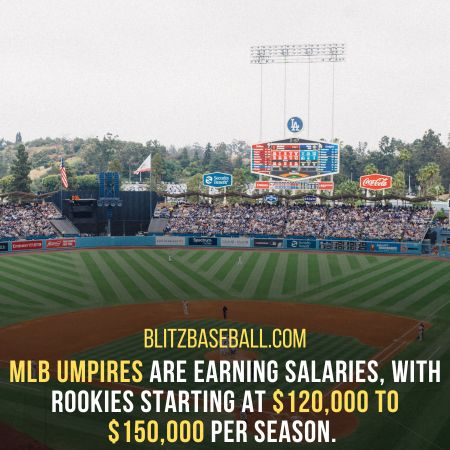Many baseball fans wonder how much do Baseball umpires make in a year? In 2023, MLB umpires are earning substantial salaries, with rookies starting at $120,000 to $150,000 per season. The average salary for umpires is $235,000, while more experienced officials can make over $450,000.
Crew chiefs, responsible for overseeing a group of umpires during games, earn an impressive $300,000 to $500,000 annually. Umpires receive base pay, game fees, and performance-based bonuses.
Additionally, MLB provides retirement benefits, health insurance, and travel allowances.
This article explores the factors influencing umpires’ earnings and the various compensation levels in the profession.
Key Takeaways
- The average salary of MLB umpires in 2023 is $235,000.
- Less experienced umpires earn around $150,000 annually, while more seasoned officials may earn upwards of $450,000 or more.
- Umpires receive raises based on years of service and experience, with new umpires considered rookies making $120,000 to $150,000 per season.
- Crew chiefs, who are senior umpires in charge of a group of umpires during a game, earn between $300,000 and $500,000 per year, which is significantly higher than regular umpires.
How Much Do Baseball Umpires Make?
MLB umpires’ salaries in 2023 range from $120,000 to $450,000. More experienced officials earn higher pay based on their years of service and performance evaluations. Factors impacting earnings include experience level, length of service, and performance evaluations.
Compared to other sports leagues, MLB umpires’ salaries are generally higher. For example, in the NBA, referees earn an average salary of around $375,000, while in the NFL, referees make approximately $205,000 on average.
However, it is important to note that the duties and responsibilities of umpires in different sports may vary, which can contribute to the differences in salary.
Overall, MLB umpires’ salaries are competitive within the sports industry. This reflects the importance of their role in ensuring fair play and upholding the integrity of the game.

Factors Affecting Salary
The factors that affect an umpire’s salary include their experience level, years of service, and performance evaluations. These factors play a significant role in determining the compensation an umpire receives.
The experience level of an umpire is crucial in determining their salary, as more experienced umpires tend to earn higher salaries. Additionally, the number of years an umpire has served in the profession also impacts their salary, with raises being given based on years of service.
Furthermore, performance evaluations are taken into consideration when determining an umpire’s salary, as those who consistently perform well may be rewarded with higher pay.
It is important to note that the impact of inflation on salaries cannot be overlooked, as it has influenced the salaries of MLB umpires over time. Inflation, along with other economic factors, has played a role in shaping the current salary structure for umpires in Major League Baseball.

Earnings for Less Experienced Umpires
Less experienced umpires in Major League Baseball earn around $150,000 annually. These rookie umpires are at the beginning of their careers and their salaries reflect their lack of experience. However, as they gain more experience and establish themselves in the league, their earnings have the potential to grow.
Earnings growth: As rookie umpires gain more experience and prove themselves on the field, their salaries have the potential to increase.
Rookie salaries: At the start of their careers, umpires can expect to earn between $120,000 to $150,000 per season.
Experience matters: The salary of a rookie umpire is lower than that of more seasoned officials, highlighting the importance of gaining experience in order to earn higher wages.
Potential for growth: With time and experience, umpires can move up the ranks and earn higher salaries, especially if they become crew chiefs.
Income for Seasoned Umpires
Seasoned umpires in the league can earn upwards of $450,000 or more annually, reflecting their years of experience and expertise on the field. These umpires have seen significant salary growth throughout their careers, as they have honed their skills and become respected figures in the game.
With such high earning potential, retirement planning is a crucial consideration for these umpires. As they reach the later stages of their careers, it becomes essential to ensure financial security for the future. Retirement benefits, including pension plans, 401(k) contributions, and Social Security supplements, are provided by MLB to support umpires in their post-umpiring years.
This helps to ensure that these dedicated professionals can enjoy a comfortable retirement after years of service to the game.
Compensation for Crew Chiefs
Crew chiefs, as the senior umpires in charge of a group during a game, earn significantly higher salaries ranging between $300,000 and $500,000 per year in MLB. This places them at the top of the umpire salary scale.
When comparing crew chief salaries in different sports, it is important to note that MLB crew chiefs generally earn more than their counterparts in other sports leagues. The reason for this higher compensation is the level of responsibility and authority that crew chiefs have during games. Their decisions can have a significant impact on game outcomes, as they have the final say on regulation interpretations.
Therefore, their expertise and judgment are crucial in ensuring fair play and maintaining the integrity of the game. The higher salaries reflect the importance of their role and the impact they have on the overall game experience.

Additional Benefits and Bonuses
While crew chiefs enjoy higher salaries and more authority on the field, MLB umpires also receive additional benefits and bonuses that contribute to their overall compensation.
One significant aspect is the pension and retirement planning provided by the league. Umpires are eligible for a pension based on their years of service and salary. Upon reaching retirement age, they receive regular payments from the pension plan, ensuring financial security in their post-umpire years.
Additionally, retirement benefits include 401(k) contributions and Social Security supplements. Another crucial benefit for umpires is health insurance coverage. MLB provides comprehensive coverage for medical, dental, and optical expenses, ensuring that umpires and their families have access to a wide range of healthcare professionals. This coverage also extends to injuries sustained during games or while traveling.
These benefits and bonuses, along with travel allowances and accommodations, contribute to the overall well-being and financial stability of MLB umpires.
Frequently Asked Questions
How are MLB umpires selected for the rookie program?
MLB umpires are selected for the rookie program based on their performance and experience in lower-level leagues. They must meet certain training requirements and undergo evaluations to demonstrate their skills and knowledge of the game.
Are there any performance-based bonuses for umpires?
There are performance-based bonuses for MLB umpires as part of their salary structure. These incentives can vary based on individual performance throughout the season and are in addition to their base pay and game fees.
What factors are considered in determining the game fees for umpires?
Factors such as experience level, type of game, and performance evaluation are considered in determining game fees for MLB umpires. These game fees, along with base pay, contribute to the overall compensation and salary of the umpires.
Do MLB umpires have any restrictions on outside employment?
MLB umpires are subject to restrictions on outside employment. They are not allowed to have second jobs that could create conflicts of interest or interfere with their duties as umpires. These restrictions ensure impartiality and focus on their primary role in officiating baseball games.
How do MLB umpires handle travel expenses for their families?
MLB umpires receive travel reimbursement for their families, which covers expenses such as food, lodging, and transportation. This support ensures that umpires and their families are well taken care of during travel for games.
Conclusion
In conclusion, MLB umpires have the potential to earn a lucrative salary. The average salary is $235,000 per year. Salaries can vary based on experience. Rookies earn between $120,000 and $150,000. Long-tenured umpires can make between $150,000 and $450,000. Crew chiefs, who oversee a group of umpires, earn even higher salaries ranging from $300,000 to $500,000.
In addition to base pay and game fees, umpires also receive retirement benefits, health insurance coverage, travel allowances, and accommodations. Overall, umpires enjoy a comprehensive compensation package in recognition of their crucial role in the game of baseball.
